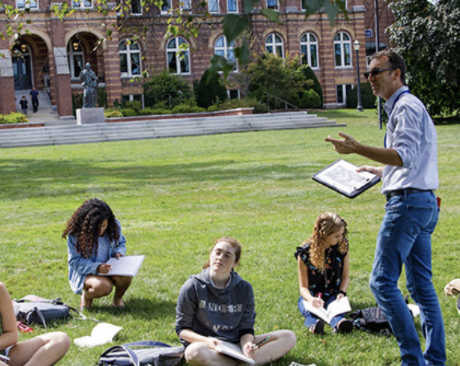What differentiates Saint Anselm College? Lately, there has been much discussion among students, faculty, and staff about what a Catholic, Benedictine, and liberal arts/humanities-oriented education should look like on our campus. Over my time on the Hilltop, I’ve written much about the importance of our mission as a Catholic and Benedictine institution. Today, I think it’s time to start talking about what it means to be a liberal arts college and how the changes to our core curriculum call for a responsibility to those liberal arts.
Before we go further, it is essential to start with a brief history and definition of the liberal arts. The liberal arts began in ancient Greece with “a desire for universal understanding (Tubbs).” The goal of the liberal arts was the intention of freeing the person to actively participate in the civic and public sphere, including education in rhetoric, grammar, logic, astronomy, arithmetic, geometry, and music. For the purposes of this article, I will use the following definition of a liberal arts education: “A liberal arts education is one that seeks to free the mind, expand horizons, and widen perspectives through coursework in history, theology, languages, philosophy, science, and the arts.”
From my perspective, being a liberal arts college means ensuring a commitment to these courses and providing more opportunities for students to engage in fields they would otherwise not engage with. Its goal must always be to help students learn to become good citizens. At a Catholic college, in particular, theology and philosophy are among the most essential classes. Philosophy serves as the backbone for theology, helping students to think and write in ways they normally would not. A philosophical worldview informs the mind in any field and helps students to think ethically. From philosophy, theology helps students connect those philosophies to a Catholic worldview and ask the bigger questions about who God is fundamentally and why I matter. While the rest of the world says that careers and furthering yourself are the most important things in life, the Catholic Church says that you were created by a God who loved you into existence. The Church proclaims the Gospel of a God who loves us so much that He came down to our level and died on the cross to show us a path to life and salvation.
I end with a quote from the patron of Western monasticism, St. Benedict. From his rule, “Therefore we intend to establish a school for the Lord’s service. In drawing up its regulations, we hope to set down nothing harsh, nothing burdensome. The good of all concerned, however, may prompt us to a little strictness in order to amend faults and safeguard love (RSB Prologue).”


